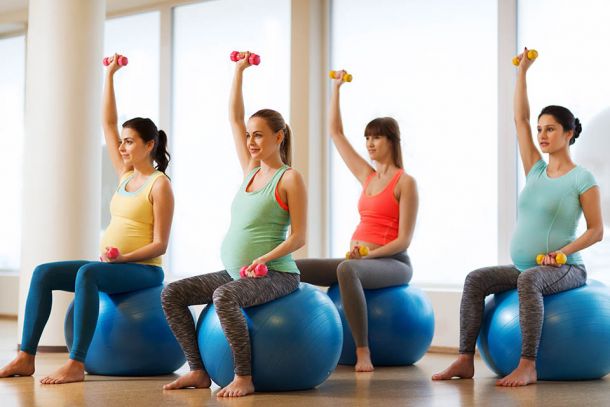
Exercise can have many beneficial effects for you and your baby but remember not to overdo it. While your body is in training for the marathon of parenthood – you are not in training for a marathon. The goal is simply to maintain – or achieve – some sort of physical or cardiovascular fitness.
Who Should Exercise?
Pregnancy is a great motivator to get moving and get healthy! The Society of Obstetricians and Gynaecologists of Canada recommends that women participate in aerobic and strength-conditioning exercises during their pregnancy and choose activities that have a low risk of loss of balance and fetal trauma. Women with a history of pre-term labour or miscarriage, an incompetent cervix, excessive bleeding or a low placenta, should consult their doctor before beginning any exercise program.
Benefits of Prenatal Exercise
- Improves cardiovascular fitness and decreases cardiovascular disease risk
- Increases muscle function, awareness and power
- Helps control prenatal weight gain
- Develops stamina for labour and delivery
- Improves control and stability of pelvic floor muscles
- Helps control gestational diabetes
- Helps maintain good overall joint range of motion
- Targets posture and balance training
- Improves core strength and stability
- Creates excellent fitness base for a speedy postpartum recovery
- Relaxation and exercise training helps increase focus and master labour breathing techniques
Safe and Unsafe Exercises
Activities to avoid during pregnancy are: horseback riding, downhill skiing, ice hockey, gymnastics and cycling. Scuba diving is also not recommended (the fetus is not protected from decompression sickness and gas embolism).
Safe exercises include: walking, stationary cycling, and swimming. Yoga and Pilates classes specifically geared towards pregnant women may be offered in your community. Check out your local gym for personal trainers if you need help becoming physically active or setting fitness goals during your pregnancy. Prenatal classes are also a great way to meet other pregnant women and will help you stay motivated and committed to your goal.
Take It Slow
If for any reason you experience shortness of breath, chest pain, light-headedness, painful uterine contractions or leaking of amniotic fluid, stop exercising immediately and consult your doctor.
